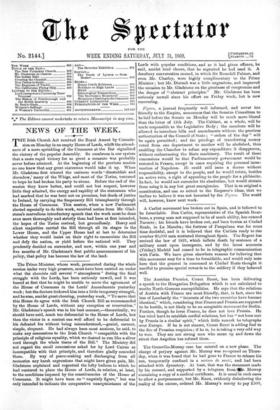NEWS OF THE WEEK.
THE Irish Church Act received the Royal Assent by Commis- sion on Monday in an empty House of Lords, whill) the attend- ance of a mere sprinkling of the Commons at the Bar signalized the victory of the popular Assembly. So cumbrous is our system that a more rapid victory for so great a measure was probably never before attained. At the beginning of the previous session no one knew that any great statesman would take it up. When Mr. Gladstone first uttered the ominous words disestablish and disendow,' many of the Whigs, and most of the Tories, ventured to hope he had broken his party to atoms. Before the end of the session they knew better, and could not but respect, however little they admired, the energy and rapidity of the statesman who bad marked that he was bent not on promises, but deeds of justice to Ireland, by carrying the Suspensory Bill triumphantly through the House of Commons. This session, when a new Parliament elected especially to do this work, received notice from Mr. Glad- stone's marvellous introductory speech that the work must be done even more thoroughly and strictly than had been at first intended, the hopes of the Tories revived, but groundlessly. Heavy and silent majorities carried the Bill through all its stages in the Lower House, and the Upper House had at last to determine whether they would insist on their right to emasculate the Bill and defy the nation, or yield before the national will. They prudently decided on surrender, and now, within one year and five months of Mr. Gladstone's first public announcement of his policy, that policy has become the law of the land.






























